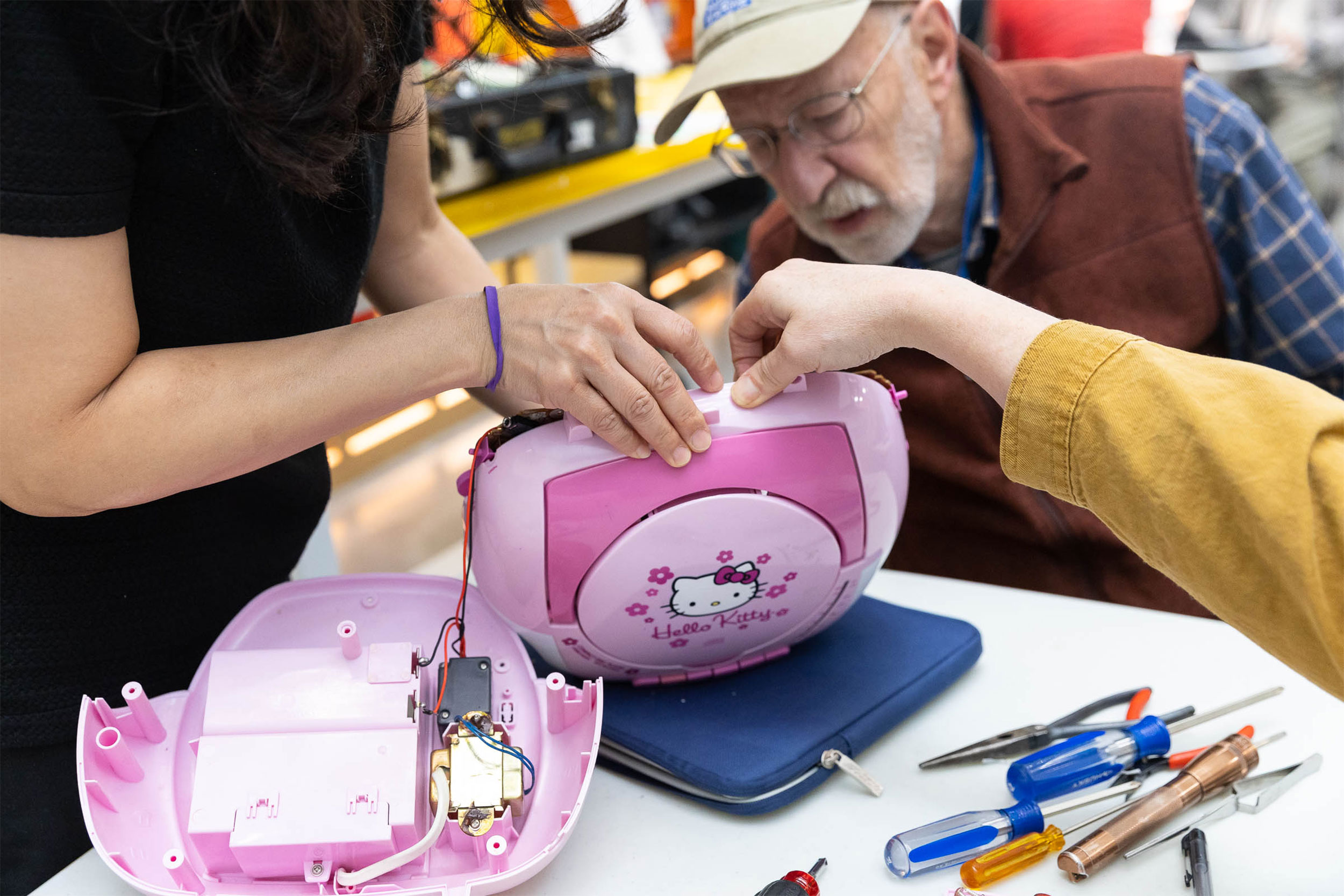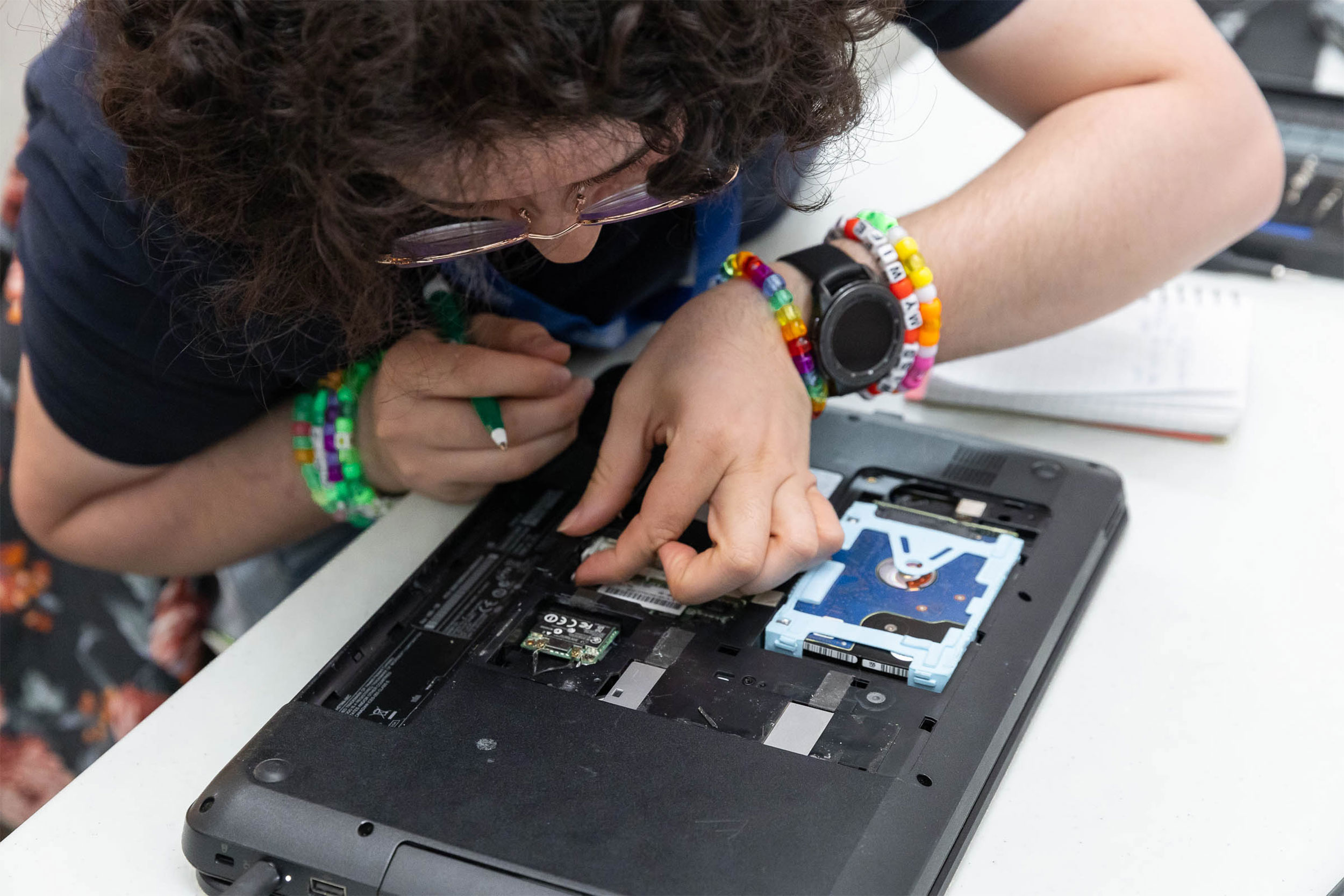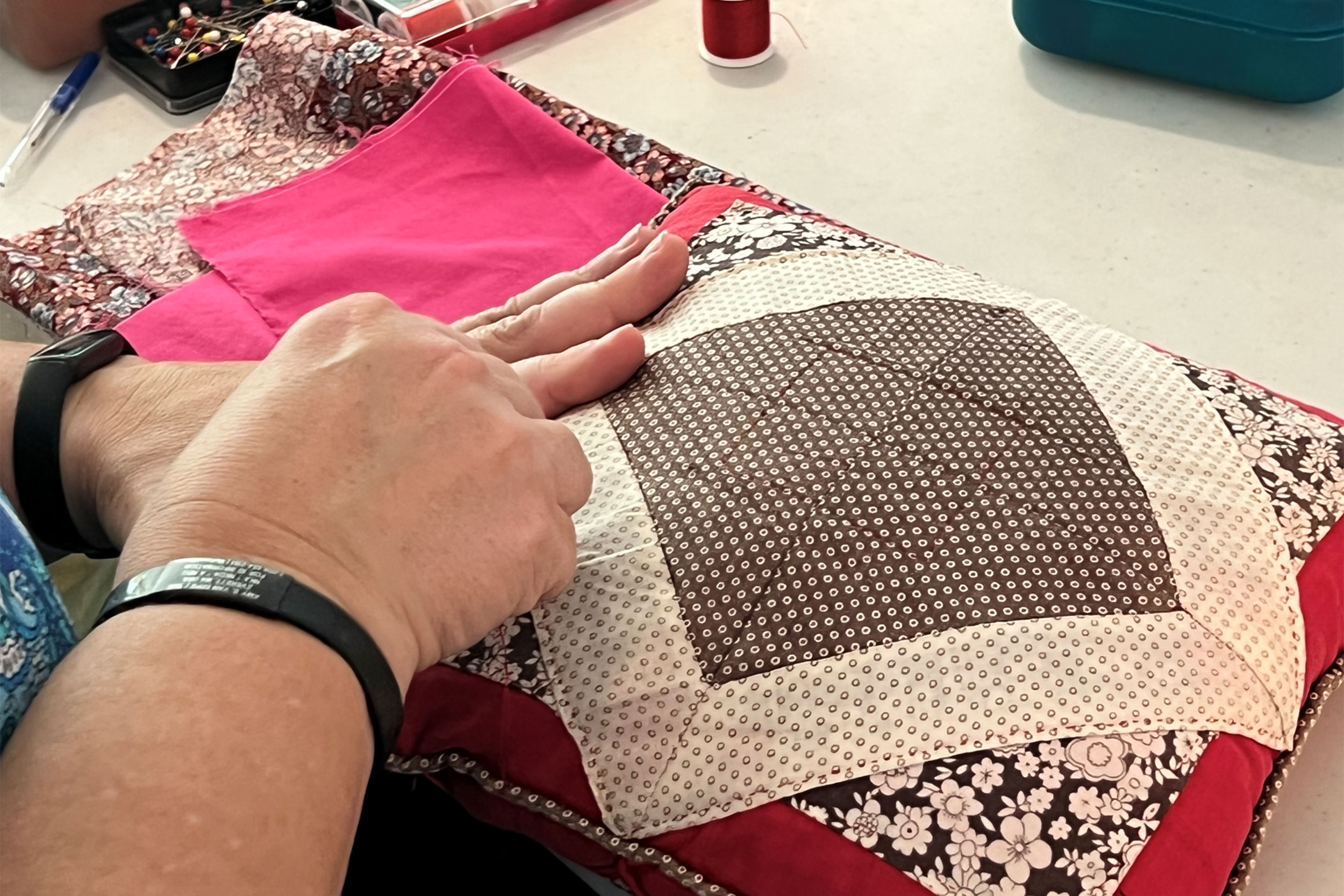
Fix-it Clinic volunteer coach Stuart Cody looks on as the owner of a Hello Kitty CD player puts the fixed item back together.
Photo by Scott Murry
A mending library
Harvard Library Fix-it Clinics promote community and culture of repair
Year-round, Harvard’s libraries offer hundreds of research tools. But at least once a semester, they break out a different kind of “toolbox” to host a Fix-it Clinic at Cabot Science Library. Students, staff, and members of the public bring stopped clocks, staticky headphones, clogged vacuum cleaners, clothing with stuck zippers, and computers flashing error messages.
Community members and library staff serve as volunteer coaches, working on each item as they talk their respective owners through what they’re doing. They don’t guarantee a fix; instead, they’re focused on community-building and collective learning of how things work, said Technology Specialist for Libraries Susan Berstler.
“Fix-it Clinics are a small but important step toward reducing the amount of waste we create,” Berstler said. “The coaches teach critical thinking skills and hands-on engineering skills that are useful for Harvard students and campus neighbors alike. Perhaps most importantly, they inspire people to at least try a repair before throwing an item away.”
“The point of the Fix-it Clinic is not just to fix things for people, but to teach them they can fix things themselves.”
Stuart Cody, volunteer coach
Amy Van Epps, Harvard Library’s director of Science and Engineering Services and a volunteer coach for the Fix-it Clinics, said she enjoys being able to interact with members of the public alongside the typical Harvard library users.
“It’s fun to see the students come in, and also to see people we wouldn’t typically see,” Van Epps said. “With community members, this is a way to let them know there are things at Harvard that are open to them.”
The concept of the Fix-it Clinic was created over a decade ago by MIT alum Peter Mui. Since then, the clinics have popped up all over the country, and are especially popular at public libraries. Harvard adopted the concept five years ago, when Berstler began running Fix-it Clinics out of the Cabot Science Library in collaboration with the Harvard Recycling & Surplus Center.
“The former head of Recycling Services came to me with the idea, and it really felt like something that fits with Cabot’s identity,” Berstler said. “As a library, we’ve always had a focus on wellness and DIY, and that element only increased after the 2017 renovation.”
The Harvard Fix-it Clinics have been going strong since 2018, holding at least one event a semester. They even continued virtually through Harvard’s year of remote learning due to the COVID-19 pandemic. While that allowed for participants far beyond the Cambridge area, it also eliminated the hands-on aspect of the event — which made things tricky, Berstler said.
“Picture being in a Zoom room with 10 people looking at an electrical component of a stove in England,” she said, adding that she was glad to return to in-person events last fall. This spring, they hosted their first Harvard Fix-it Clinic at the new Science and Engineering Complex in Allston.
Berstler attends all the Harvard-based clinics, as does Dailey Brannin, Harvard Recycling Services supervisor. They have many regular volunteers from around the community, as well as library staff members.


Fix-it Clinic volunteer coaches Hayden Bauer examines parts of a laptop as Amy Van Epps mends a torn pillow.
Photo by Scott Murry; courtesy of Amy Van Epps
As far as the items brought to be fixed, it’s an impressive variety, Berstler said, and there are always surprises. They get a lot of kitchen appliances, earbuds, vacuums, children’s toys, lamps, and clock radios. But they’ve also had people bring in everything from an antique sewing machine to a high-powered microscope to a snowblower; the latter prompted an official moratorium on oil- or gas-powered items at Harvard Fix-it Clinics.
Some volunteers have specialties like electronics, small appliances, or, in Van Epps’ case, sewing. She comes to each clinic equipped with her sewing machine, pieces of fabric for patching, needles and thread, and even a jar of buttons.
At the last clinic in November, she was busy for two hours straight, helping repair a rip in a quilted pillow and still finding time to fix zippers on eight Harvard students’ winter coats. Once, she had a student happen to walk by the event with a ripped belt loop.
“They asked me, ‘can you fix this? I’m about to go to class,’” Van Epps recalled with a laugh.
Berstler said she has slowly seen the number of students attending the clinics increase over the years. One of her goals since returning to in-person events is to get students more involved, as either attendees or volunteers.
“The vision of the inventor of the Fix-it Clinic was that there would be, say, a student engineering group who would want to do the clinic once a month,” she said. “We’re not at that point yet with the Harvard clinics, but I do think we are moving in that direction.”
She and Van Epps are always excited to see students stop by. It furthers Berstler’s goal of getting the word out to more students, but it is also gratifying to connect with a younger generation used to items being “upgraded” or thrown out, rather than repaired.
“A lot of students are more in the mindset of replacing things,” Van Epps explained, “so it’s nice to show them something can be fixed.”
A similar philosophy motivates many volunteer coaches, like Boston resident Stuart Cody. Cody, a former Harvard and MIT employee, said he gets satisfaction out of showing people that “broken” things still have value, and he considers making something even partially reusable a win.
At the April clinic, he triumphed over a supposedly broken Hello Kitty CD player. As music drifted through its speaker, the owner of the CD player exclaimed “You fixed it!” Shaking Cody’s hand and calling him “magic.”
Applause broke out among the other volunteer coaches — the standard reaction to a “fixed” item at any clinic — as Cody smiled. He beckoned the CD player owner back over to his workstation and began walking her through how to correctly replace the parts of the item he had taken apart.
“The point of the Fix-it Clinic is not just to fix things for people, but to teach them they can fix things themselves,” he said, handing the owner of the CD player a screwdriver. “There’s nothing magic about it!”




